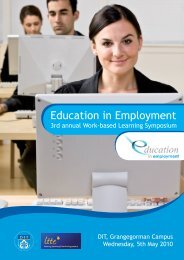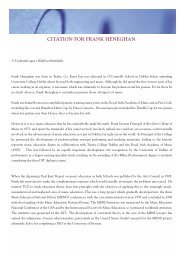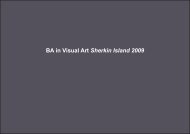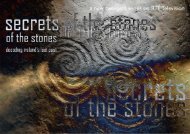TWICE THE SIZE - DIT Update - Dublin Institute of Technology
TWICE THE SIZE - DIT Update - Dublin Institute of Technology
TWICE THE SIZE - DIT Update - Dublin Institute of Technology
Create successful ePaper yourself
Turn your PDF publications into a flip-book with our unique Google optimized e-Paper software.
the psychological aspirations <strong>of</strong> identity, affluence, wealth and happiness have been fulfilled for<br />
the majority <strong>of</strong> middle-class people in Cork, the symptoms <strong>of</strong> stress, depression and alienation<br />
are increasing for the ethnic minority underclass. As a result, it is increasingly evident that<br />
radical social reforms are necessary. An inter-agency response is urgently required to address<br />
the current phenomenon <strong>of</strong> social exclusion, particularly if scenes such as those witnessed<br />
during the 2022 London riots are not to be repeated in Cork and other Irish cities. The people <strong>of</strong><br />
Cork will need to question their innate resistance to change, which is stifling the emergence <strong>of</strong><br />
social cohesion and rendering future ethnic conflicts a given, rather than a probability.<br />
Although global networking technology has pulled the majority <strong>of</strong> Cork people together<br />
throughout the 2020s, the dark side <strong>of</strong> the technological boom is being felt by the digitally<br />
disconnected. The emergence <strong>of</strong> “informational black holes” has resulted in a widening <strong>of</strong> the<br />
digital divide, and as Manuel Castells, Pr<strong>of</strong>essor <strong>of</strong> Sociology at Berkeley University, once<br />
warned, in the networked society, if you are outside the network, you simply don't exist. The<br />
disconnected in Cork are increasingly feeling this type <strong>of</strong> alienation and represent another<br />
demographic being excluded from the city. These cultural battles represent the most important<br />
challenges for the future <strong>of</strong> Cork in the 2030s, for business, for people and for politics.<br />
However, if Cork is able to connect the logic <strong>of</strong> networks with the logic <strong>of</strong> culture and identity,<br />
a dynamic equilibrium might be reached. In sharp contrast to the significant levels <strong>of</strong> state<br />
capital invested in science and technology at the turn <strong>of</strong> the century, calls are now being made<br />
for investment in the social<br />
sciences, and particularly in<br />
emerging geophilosophy studies,<br />
in an attempt to better<br />
understand how this equilibrium<br />
might be reached. There is a<br />
realisation now that transdisciplinary<br />
education that links<br />
across, not between, the<br />
disciplines will be pivotal in<br />
understanding the processes<br />
transforming society in the 2030s.<br />
Education<br />
At a time when education is the number one international economic and social priority,<br />
competition is rife in attracting pr<strong>of</strong>essional learners and intellectual consultants to Ireland and<br />
indeed to Cork. In order to compete with the emerging market <strong>of</strong> just-in-time, individualized<br />
learning, where learners can "dial a tutor" anywhere in cyberspace, CIT and UCC together<br />
launched the “Learning a Living” strategy in 2012 that aimed at promoting Cork as a vital wheel<br />
157








